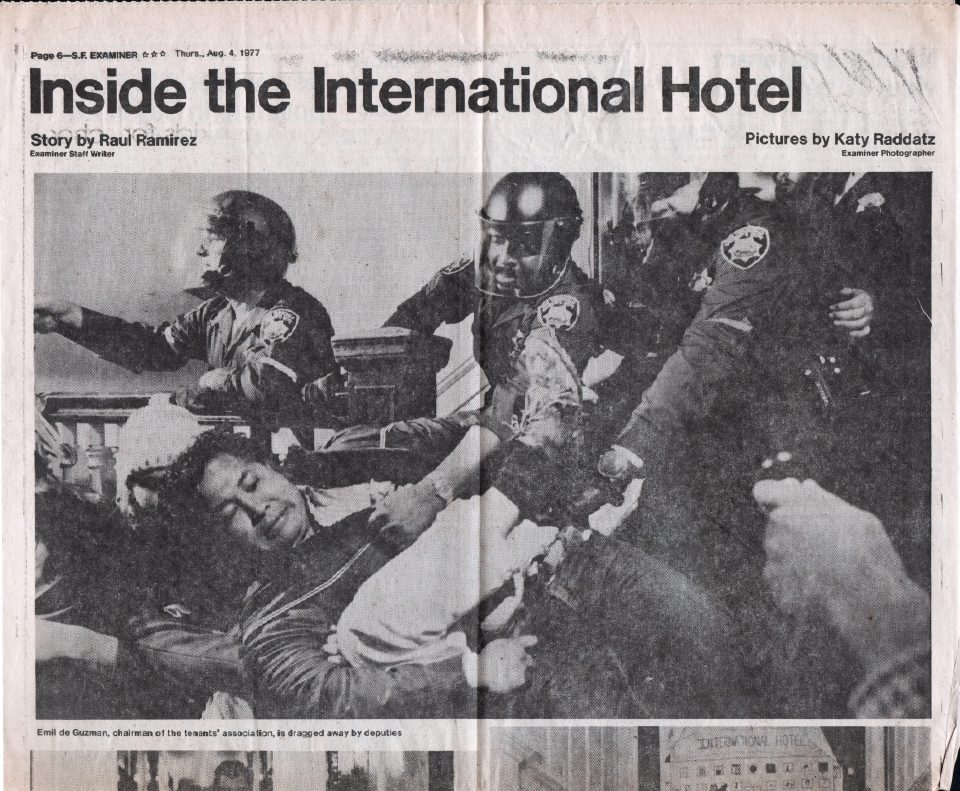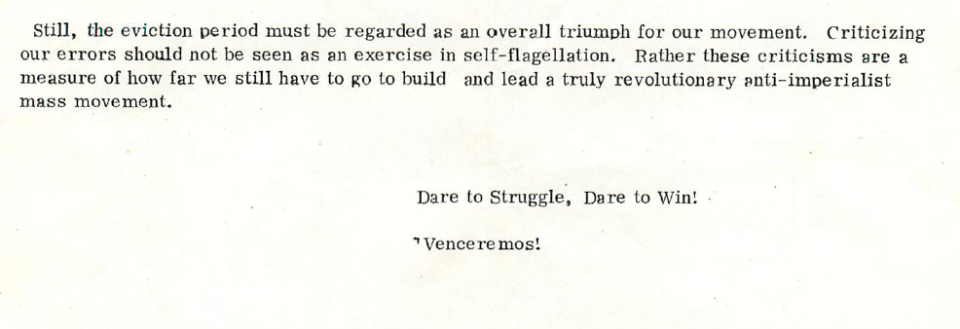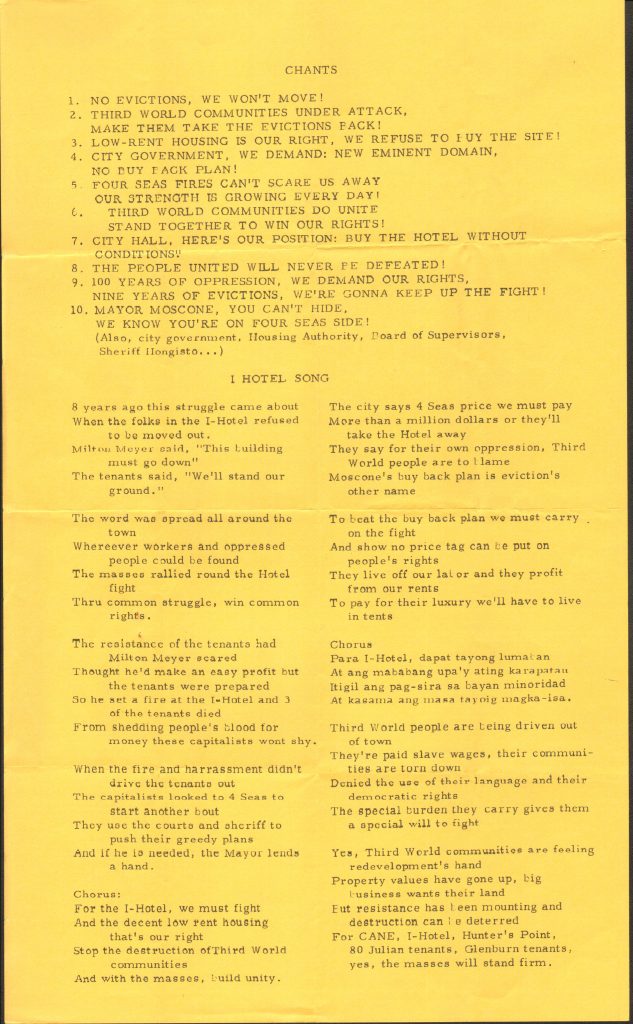

Vibrant energy and charged militant resistance defined the evening of August 4, 1977, when more than 2,000 people mobilized to defend the Filipino and Chinese elders who refused to leave their homes at the International-Hotel (I-Hotel). Opposing an eviction notice that heralded the replacement of low-income housing units with a multi-level parking lot, tenants banded together with support networks, students, and workers to face the hundreds of riot police officers who were directed to carry out the eviction. Deploying a human barricade around the premises, organizers linked arms and held their ground even amid violent blows from the riot police. It was a pivotal demonstration, but as tensions grew the police acted swiftly and penetrated the barricade, advancing on the I-Hotel. A photograph of the I-Hotel Tenants Association (IHTA) Chairman, Emil de Guzman, shows officers brutally drag him from the building, hauled by the collar of his jacket. It covered the front page of several newspapers, announcing the eviction to national audiences.

NO EVICTIONS, WE WON’T MOVE!
In 1987, twenty years after the eviction, the sustained efforts of what had become a decade’s long battle finally materialized in a historic victory for housing rights: the I-Hotel would be restored at its original site with 104 affordable senior housing units and a community space. While we remember the night of August 4 as a major demonstration of people power leading up to this win, materials housed within the I-Hotel Organizing Materials Collection at the Freedom Archives reveal that not everyone conceived of it in this way at the time. Last week marked the 43rd anniversary of the action, and to commemorate the event, we want to engage some lesser known perspectives that shed light onto the scope of resilience manifested throughout the I-Hotel fight.
100 YEARS OF OPPRESSION, WE DEMAND OUR RIGHTS
NINE YEARS OF EVICTIONS, WE’RE GONNA KEEP UP THE FIGHT!
“A View From the Front Door” is an assessment written by the tactical and security teams who were on the ground during the night of August 4 to help lead the demonstration. By no means representative of the general attitudes of everyone involved in the action, the assessment does suggest that some of the integral organizers perceived the demonstration as more of a missed opportunity than an achievement of mass resistance. The assessment engages the practice of criticism-self-criticism (CSC) and prompts us to consider the utility, as well as limitations, of the CSC method. It also encourages us to reflect on how we measure impact in movement spaces.
THIRD WORLD COMMUNITIES UNDER ATTACK, MAKE THEM TAKE THE EVICTIONS BACK!
The assessment identifies several issues that led to the adverse outcome of SFPD’s advancement on the building, each pointing to an overarching question around how the roles of security and tactical teams are, and should be, conceived in a militant project. The authors reason that the tactical team, under immense pressure, lost sight of the fact that people were “politically clear and tactically willing to resist.” Those who put their safety on the line understood that militant resistance to the police often results in arrest or harm. Yet, according to the authors, this basis was lost on the ground. In a meeting after the eviction, one person expressed that, “in some ways it is easier to put your own body on the line than to watch or even order someone else to put their body on the line.” “A View From the Front Door” suggests that the sentiment, though valid, diverges from the critical point that “the safety of the crowd and militant action [are] not opposite aspects of a contradiction.” The authors conclude that the material conditions for protracted militancy against the state existed, but the movement was lacking in preparation to fully seize the moment.

While identifying areas of improvement is a critical component of organizing work (and a primary objective of assessments), the value of “A View From the Front Door” is not necessarily its engagement with this practice, but the ways in which it points to the importance of contextualizing situations under scrutiny within larger, relative frameworks. Without this framing, it would be easy to adopt a vantage point that places the blame of an outcome on a few individuals, rather than on factors outside of one’s control, such as the state and its deployment of brute military force in the case of the August 4 demonstration.
Could the evictions have been prevented if the teams were more thoroughly briefed on their roles? If a higher level of unity was reached? If tactical had practiced better communication? Constructive questions seem to underpin the assessment, but as a possible consequence of the authors’ adamance to find fault within their own ranks, an abbreviated analysis of the demonstration emerges and eclipses its relevance to the larger picture of anti-imperialist resistance.
Though the assessment suggests that internal issues cost the eviction, a contemporary perspective can easily refute this analysis. What, then, might the significance of this document be? “A View From the Front Door” provides a glimpse into the obstacles of long-term strategizing, especially when a perceived failure causes a break in the momentum of movement organizing. Most compellingly, it reveals that what may appear as a failure at one moment may prove to be a success later on.
43 years ago, San Francisco witnessed a historic moment marked by the vibrant fighting spirits of the masses and a circumstance ripe for revolutionary change. Today, we observe a similar moment of intensified political activity following the uprisings spurred by the murder of George Floyd, Breonna Taylor, Ahmaud Arbery, and many other countless Black lives. With the COVID-19 pandemic swiftly exposing the contradictions and dysfunction of capitalist society, we too are confronted by a circumstance ripe for revolutionary change. On the 43rd anniversary of one of the most impressive achievements of the anti-imperialist left, we continue the legacy of those who came before us by treating the pertinent lessons of past organizing as a lens from which to envision a revolutionary path forward. Rather than dwell on the possible scenarios that could have transpired on that August night, it is our responsibility to ask not what could have been done differently, but what is to be done now?

THE PEOPLE UNITED WILL NEVER BE DEFEATED!
– danielle


